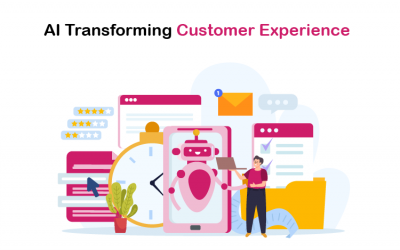How Purpose-Built AI Can Help You Build A Great Customer Experience

Key Takeaways
- AI enhances the customer journey and strengthens customer support.
- It gives you a personalized customer experience through personal data analysis and proactive interactions to gain customer loyalty and engagement.
- Adopt AI carefully in customer service by selecting great and improved technology, addressing privacy and accuracy, and also training for challenges for successful implementation and ROI.
What is AI CUSTOMER Experience?
When you employ artificial intelligence (AI) technologies, like chatbots, digital agents, and machine learning, to provide your customers with a proactive experience, it is known as an AI customer experience. AI can analyze customer data to give you a clear picture of your client’s past purchases, online browsing patterns, and social media activity.
AI then evaluates this data and can give targeted offers and personalized recommendations for goods and services.
Let us dig deep to understand the role of AI in customer experience.
1. Business Needs
- Tailored Solutions according to Business Requirements: Purpose-built AI particularly addresses customer experience concerns. In contrast, general AI may have broader applicability. Imagine you have an e-commerce business, so you can utilize AI to customize product suggestions. Similarly, a financial services company might use AI to detect fraud in client transactions.
2. Enhanced Individualization
- Customized Interactions: AI designed with a specific purpose may evaluate consumer data to provide specialized experiences. You can ask AI to provide customized product suggestions, marketing messages, or customer service replies. This makes sure that your clients get services and materials pertinent to their requirements and tastes.
3. Predictive Capabilities
- Anticipating Customer Needs: This purpose-built AI can help you predict what a customer might need next, allowing your business to offer great solutions. This predictive aspect helps in creating a seamless and provident customer experience.
4. Seamless Integration
- Working with Existing Systems: Purpose-built AI is often designed to integrate smoothly with a company’s existing technology stack. Customer-facing tools like CRM systems and marketing automation platforms ensure that AI helps to enhance the existing customer experience infrastructure.
5. Continuous Improvement
- Learning and Evolving: Purpose-built AI can continue to learn from customer interactions. This helps in refining their algorithms to improve over time. The more AI interacts with the user’s customer experience, the better, more personalized and effective the service becomes.
6. Industry-Specific Solutions
- Contextual Relevance: Purpose-built AI is frequently created with an in-depth understanding of the sector it supports. AI in healthcare, for instance, can be developed to comprehend and control patient interactions. Whereas AI in retail can be concentrated on improving the buying experience.
Examples of AI Purpose-Built for Customer Experiences
- Retail: In this type of business, AI helps provide personalized product recommendations, a great pricing model, and automated customer service.
- Banking: AI helps detect fraudulent transactions, provides personalized financial advice, and provides all types of loan information.
- Healthcare: AI helps you reschedule appointments and gives you health recommendations.
When implementing AI in customer service, there are three things to consider
Although AI is advancing, organizations face problems and are set to lay back in the competition. They cannot adopt fast changes in AI, and as a result, firms are suffering. So, to avoid these problems, you need to keep in mind :
1. Impact on the workforce: Service executives need more skills in AI, particularly generative AI, a new sector. For instance, 66% of executives think that the people on their team lack the expertise necessary to deal with AI. Service industry workers also worry about losing their employment, which might make them reluctant to adopt new technologies. Communicate to your workers how AI will increase productivity while acknowledging that human expertise is still crucial to delivering a first-rate customer experience when you integrate AI into your service business.
2. Trust and reliability issues: The rapid changes in AI technology are advanced but imperfect and require continuous improvisations. Similarly, understanding and solving complicated customer queries is a significant concern of AI systems. To keep your business and customer data secure, you must be worried about privacy, and trust should be taken seriously. When you have complete trust and reliability in AI, then AI is the best tool for your customer service
3. Investment and implementation: A new implementation in your business requires a significant capital investment. Small businesses or organizations with limited resources may find it difficult to fund AI implementations and need more technical expertise to deploy and maintain such systems.
AI Role in Transforming Customer Service Teams
AI can transform your customer service dynamics, significantly changing team operations and client interaction for your business. It is revolutionizing customer service teams by automating processes, increasing agent efficiency, and delivering intelligent routing, predictive aid, and tailored support. AI aids in onboarding and training new recruits, allowing the customer support staff to improve their service while also lowering training time. This reduces wait times, allows agents to focus on more complicated issues, and increases customer satisfaction through better customer service.
Personalized service through AI-driven insight
AI improves customer service by enabling tailored interactions. AI can provide individualized experiences and assistance using vast client data, increasing customer loyalty and happiness. In other words, with AI, every connection is an opportunity to amaze and engage the client deeper, improving the overall customer journey.
Real-time solutions with AI-powered chatbots
AI-powered chatbots are the primary delivery mechanisms for real-time customer assistance solutions. These chatbots, capable of handling a huge volume of interactions, may do repetitive jobs, answer frequent difficulties encountered in customer care FAQs, and minimize average handling time through quick responses, supplementing the work of a customer service representative.
What is the result? Customers receive rapid, individualized assistance anytime they require it, particularly during customer calls, hence improving their entire customer service experience with each customer service engagement, owing to the specialized customer support team.
Here are top AI powered chatbots to consider.
Leveraging AI for In-depth Customer Insights
AI’s strengths include extensive consumer information. By analyzing huge amounts of customer data, AI can identify patterns in behaviour, market trends, and recurring issues, giving enterprises actionable insights. Tools like Google Cloud AutoML Tables and Salesforce Einstein Analytics use predictive analytics and machine learning to identify trends in customer data, allowing businesses to anticipate client wants and improve the customer experience.
Streamlining operations via automated processes.
AI also contributes to operational efficiency. By automating simple procedures and updating knowledge base articles, AI allows customer service representatives to focus on what is most important: resolving complex customer issues and enhancing customer help.
IBM Watson Health AI Case Study
IBM Watson Health is one example of AI being used in healthcare. This company has developed an AI-powered platform for oncology designed to help healthcare professionals diagnose and treat cancer.
Watson for Oncology uses natural language processing (NLP) and machine learning algorithms to analyze large amounts of patient data, including medical histories, lab reports, and other diagnostic tests. The platform generates personalized treatment recommendations for individual patients based on their medical needs.
Since Watson oncology was implemented, healthcare professionals have reported significant improvements in the accuracy and speed of cancer diagnosis and treatment. Watson for Oncology has helped doctors identify previously overlooked treatment options and avoid potential medical errors.
Conclusion
Purpose-built AI can accelerate your journey to achieving a medal-worthy customer experience by delivering tailored, efficient, and highly responsive solutions. AI technology enhances personalization, streamlines operations, and accurately predicts customer behavior and needs. This can be done only by focusing on your business’s and customers’ unique needs.
Embracing purpose-built AI is a significant step that transforms customer experience into a key differentiator, driving sustainable growth and success. A good customer experience platform can be really helpful in scaling your business to new heights and adapting the latest technological advancement’s
This improves your customer loyalty but also takes your business to another level.
Recent Posts
- How People Analytics Can Utilize Data to Drive Business Results
- The Role of AI in Enhancing Employee Feedback Systems
- How Purpose-Built AI Can Help You Build A Great Customer Experience
- Why is Customer Sentiment Analysis Crucial to Your Business?
- Customer Experience Statistics You Need To Know for 2025 | CX Statistics 2024



